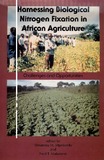| dc.contributor.author | Keya, SO | |
| dc.date.accessioned | 2015-07-25T07:54:52Z | |
| dc.date.available | 2015-07-25T07:54:52Z | |
| dc.date.issued | 1994 | |
| dc.identifier.citation | Keya, S.O. (1998) Contribution of Biological Nitrogen Fixation Towards the African Food and Environmental Challenges, in Mpepereki, S.M & Makonese, F.T. (eds.) Harnessing Biological Nitrogen Fixation in African Agriculture: Challenges and Opportunities: Sixth International Conference of the African Association for Biological Nitrogen Fixation, 12-17 September, 1994, Harare, Zimbabwe: selected papers. Mt. Pleasant, Harare: UZ Publications, pp. 1-11. | en_US |
| dc.identifier.uri | http://opendocs.ids.ac.uk/opendocs/handle/123456789/6510#.VbM_z_m0dco | |
| dc.identifier.uri | http://hdl.handle.net/11295/88782 | |
| dc.description.abstract | Efforts to increase food production for the rising population in Africa can benefit from the large
pool of information on biological nitrogen fixation (BNF). The continued rise in the cost of chemical
fertilisers and their unavailability to farmers have further propelled the quest for viable BNF
technologies. Successes in BNF, especially the establishment of inoculant production in several
countries in Africa is seen as a major step in the right direction. Similarly the acceptance of well
nodulated legumes such as soybean, Leucaena, and the Frankia-nodulated plants like Casuarina
provides positive bases for BNF demonstrations. Due to Africa’s rich biodiversity, potential exists
for exploiting newer plants and development of stress-tolerant plant hosts and their microsymbionts.
Positive results on limited mycorrhiza-Rhizobium co-inoculation which alleviates phosphorus
deficiency while facilitating N2 fixation ought to be supported. At the same time, the search for
acid-tolerant Rhizobium strains should be intensified. Many studies on response to inoculation
have gained from regionally coordinated trials and a model which is now available to predict
such response is likely to augment field studies provided chemical soil data is available. The need
for an increased knowledge base on Azolla, Cyanobacteria and Frankia to augment the Rhizobium
system is emphasised. Similarly soil management strategies aimed at improving soil fertility
employing current BNF methodologies are examined. Further the need for broad host range
Rhizobium strains, costing of BNF, and field demonstrations of BNF are discussed | en_US |
| dc.language.iso | en | en_US |
| dc.title | Contribution of biological nitrogen fixation towards the African food and environmental challenges | en_US |
| dc.type | Presentation | en_US |
| dc.type.material | en_US | en_US |

